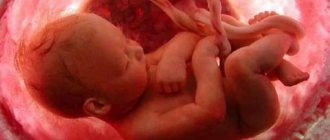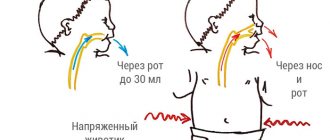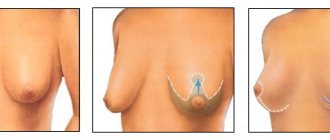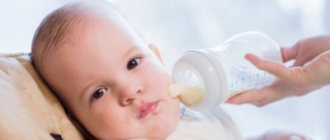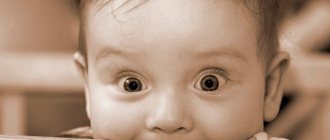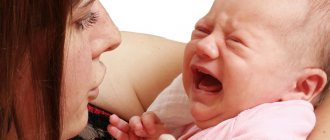Why does a child hiccup and how to help him
If a small child often hiccups, many parents wonder when it is normal and when to run to the doctor, how to prevent or stop hiccups in a newborn after each breastfeeding or powdered milk formula. It's time to deal with the hiccups! Polina Aleksandrovna Kizino, a pediatrician and leading expert at the online school for future and established parents “SMART Mama,” talks about the causes of its occurrence and ways to eliminate it.
— Polina Aleksandrovna, please tell us why a newborn baby hiccups, what are the causes of hiccups in infants?
The baby hiccups even before birth in the mother's belly
— The first hiccups occur when the baby is still a fetus in the womb.
Causes of hiccups
- There is not a single clear theory that would explain the mechanism of occurrence of such hiccups. Some experts associate it with preparation for breathing movements, others say that the child swallows amniotic fluid - his stomach becomes full and irritates the vagus nerve next to the diaphragm.
Infant hiccups
— If we talk about newborns and slightly older children, hiccups are also often caused by irritation of the vagus nerve. The reasons for such irritation are different. And each baby has their own.
Causes of hiccups
- Overeating:
The contents of the intestines or stomach are so voluminous that they compress the vagus nerve. - Regular regurgitation:
stomach contents enter the esophagus and irritate its mucous membrane. Thus, excitation is transmitted to the vagus nerve, including the diaphragm. - Hypothermia:
the baby is simply cold and uncomfortable in a wet diaper.
— When can you say that hiccups are frequent?
— There are no clear indications that so many hours a day are the norm, and more are not the norm. The more important thing is whether or not you can cope with the hiccups.
Example
The cause of hiccups is overeating. The child overate - his stomach increased in size and began to irritate the vagus nerve - hiccups appeared. If at the same time the child burped a little or little time passed (the contents of the stomach went further into the intestines), then accordingly the stomach stopped putting pressure on the vagus nerve, and the hiccups went away. The hiccups did not arise because there was something wrong with the nervous system, but because the child had overeaten.
Even if this happens every feeding, we can see the reason for the hiccups. And if you do not overfeed the child, it will not exist. In this case, even regular hiccups will be considered normal.
The situation is abnormal when we cannot find the cause of hiccups and cannot cope with it. Therefore, you need to focus not on the frequency of hiccups, but on whether you can cope with it.
— Why are young mothers afraid of hiccups? Do you really need to worry?
- It’s scary because they think that hiccups make the child feel uncomfortable. And the mother wants to help her baby so that everything is in order. But in most cases, hiccups are not a problem and usually the baby is not bothered. Hiccups worry mom. Therefore, if everything is fine with the child and he is active, he is in a normal mood, he does not react in any way to hiccups, the mother should not worry.
— Is it possible to recognize the symptoms of hiccups that indicate problems with the baby’s health?
— When a child cries and cannot calm down, something is clearly wrong with him. In such a situation, it is worth thinking about the fact that it is not hiccups that are the cause of concern - most likely, it becomes one of the manifestations of a condition that worries the baby. Here the hiccups will be secondary. In this case, it is better to consult a doctor and figure out what is happening to the child. But if the child is fine, he is active, cheerful and cheerful, then, of course, the mother should not worry.
— Is hiccups ending in vomiting a reason to visit a pediatrician?
— The presence of vomiting in a baby is a rather unpleasant symptom, with which in any case it is advisable to see a doctor. However, it is necessary to separate vomiting and regurgitation.
If your child is vomiting
When the food eaten has almost completely left the child’s stomach, this is abnormal and there is clearly some kind of problem. In such a situation, hiccups are secondary, and the problem must be sorted out with a doctor.
If your baby is spitting up
Most likely, we are dealing with overeating. The baby overate - his stomach grew a little - the child vomited up the extra part that was bothering him. After this, the hiccups stopped and the baby felt better. This situation is a variant of the norm. And if everything is fine with the child, weight gain is according to the age norm, then this should not bother the mother in any way.
If you experience regular vomiting and excessive regurgitation, you should definitely see a doctor!
How to avoid hiccups
The main cause of hiccups in most children is overeating. Having figured out why your baby hiccups, you can avoid unpleasant moments if you pay more attention to his diet:
- Feed the baby in small portions. If you are feeding with formula, then you should not give more than the prescribed amount of food, even when it seems that the child is still hungry. He drinks the bottle quickly enough and does not yet understand that the feeling of satiety has already arrived, you need to wait 15 minutes, and the baby will stop worrying. If your baby eats breast milk, you should maintain at least short intervals between feedings; you should not hold your baby under your breast for more than 20 minutes.
- Hold your baby at a 45 degree angle when feeding. This reduces the possibility of swallowing air. When the child can be seated and fed while sitting, only the back should rest on something, for example, on the mother, if the child is seated with his back to himself.
- Pay attention to the sound your baby makes while feeding. If he smacks his lips often, then he swallows air along with the milk. You should make sure that the nipple is latched correctly (the entire nipple halo should be in the baby's mouth). When feeding from a bottle, watch your nipple latch. The air gap should be small.
- Make sure that the nipple from the bottle is clean; if the remaining milk interferes with feeding, then the baby will swallow more air than necessary.
- Your baby should not go to bed at night with a full bottle. This is fraught with overeating, tooth decay and the possibility of choking, because milk flows from the bottle in a constant stream. Better let him suck his fists.
Hiccups in newborns
Hiccups are a natural process. In a newborn child, it often occurs due to insufficient maturity of organs or due to adaptation to the environment. By the year the number of attacks decreases. Like an adult, a baby develops seizures from cold, hunger, fear, or overeating.
A baby may hiccup after bathing, while changing clothes, after eating, or from laughing. There are many reasons for the reaction, as well as ways to eliminate the phenomenon. Often, hiccups go away on their own and do not require treatment. Rarely is a sign of a disease of the digestive system or nervous system.
What to do if your newborn hiccups after feeding
If an infant hiccups immediately after feeding, then the mothers themselves, especially young and inexperienced ones, are mostly to blame for this. Hiccups in babies are the result of overeating (this is the fault of most even experienced mothers, who feel that the baby is not getting enough to eat) or caused by swallowing air. To prevent hiccups from occurring in a child after eating, it is important:
- Do not feed your baby in excess, it is best to do it on demand, the portions will be smaller, the intervals will be more frequent. But he definitely won’t overeat.
- Apply it correctly to your chest. And if the baby is artificial, then bottle feeding should imitate the natural process of breastfeeding. The hole in the nipple for the bottle must be selected correctly. A hole in it that is too large will make the flow of the mixture rapid, and the child will simply begin to choke, swallowing air at the same time. And after a while the hiccups will begin. In general, the classic version is that sucking from a bottle should be done with little tension.
- You should not tear your baby off the breast while breastfeeding until he does it himself. If there is a lot of milk and you see that the baby is choking or cannot cope with such volume, express some milk. And after feeding, hold it in a column for a little while to let out excess air. Otherwise, your newborn will hiccup after every feeding.
How to get rid of hiccups in your baby
If the child is already hiccupping, take him in your arms and press his tummy tightly against you. He will feel your warmth and care, calm down, and you will notice how very soon his colic will go away, excess air will come out, and the hiccups will stop.
You can give your baby some plain water, which is very helpful for prolonged hiccups.
If the diaphragm does not stop contracting within two days, you should definitely consult a doctor, since such prolonged attacks of hiccups can cause a serious illness that cannot be diagnosed without additional tests.
Symptoms
Hiccups are a reflexive act provoked by various factors, so parents should notice what triggers them, how often they appear and note their duration. Monitoring the baby gives the most effective results for eliminating the symptom of hiccups in the future. If the baby hiccups for no more than 10-15 minutes, it is not dangerous. The most common option is hiccups in newborns after feeding. Above we have already discussed why this phenomenon occurs after eating; below we will indicate how to deal with it.
But there are times when a child constantly hiccups, almost all day long. In this case, you need to carefully monitor other symptoms during this period: the presence of vomiting, belching, abdominal pain, high-pitched screaming, coughing, bloating, or the appearance of cramps, movement disorders in the arms and legs, and weakness in the limbs. Additional symptoms indicate either pathology of the gastrointestinal tract, respiratory system, or diseases of the central nervous system. This remains to be determined as a result of further examination of the child.
What not to do when a child hiccups
Most methods used to eliminate diaphragm spasms in adults are not suitable in the first months of life. If adults can be “switched” by a loud sound: the clap of a plastic bag, screaming, or the ringing of an alarm clock under the ear, then in children such exposure can provoke spasms or damage to the eardrum. Fear is an inappropriate influence.
To remove hiccups from a newborn, you should not slap him hard between the shoulder blades. Don't pull him by the legs, turn him upside down or turn him around sharply. The most harmless thing that can be caused is regurgitation, but it can cause injury. It is believed that children's bones are soft, but a sudden movement can easily provoke a fracture of the legs, ribs or collarbones.
Under no circumstances should babies be given something sour that is not intended for a child’s stomach. Long-term treatment of dysbiosis and intestinal disorders will cause more inconvenience than spasms that go away on their own.
Other causes of hiccups
A child does not always hiccup due to feeding with milk, even if the diaphragm begins to contract immediately after eating. This may just be a coincidence, but in fact the hiccups were caused by one of the following factors:
- Excess of emotions. The children's nervous system cannot be called stable, which is why it is easy for babies to become excited in a matter of seconds, for example, due to fear of a stranger, a change of environment, or every sharp unexpected sound. An anxious state leads first to a spasm of the diaphragm, and then to its convulsive contractions.
- Hypothermia. Due to the underdeveloped thermoregulation system in their body, infants are unable to maintain their body temperature, which is why they are constantly freezing. To understand whether a child is hypothermic or not, just touch his hands: cold - the baby is cold, warm - everything is fine.
Pathogenesis
The main mechanism for the occurrence of hiccups in infants is dysfunction of the nervous and digestive systems, which are not perfect in newborns. The nerves that control the diaphragm (vagus and sympathetic) are stimulated by various stimuli and the impulse rushes to the brain. From there a reverse impulse goes to the diaphragm, which, under its influence, suddenly and sharply begins to contract rhythmically. Spasmodic contraction of the diaphragm forces the child to take a deep breath with a narrowed glottis - a deep breath is obtained with the sound “hic”.
In babies, hiccups most often develop when the vagus nerve is irritated, which occurs when the stomach is full of food, air, and intestinal bloating. Irritation of the vagus nerve also occurs when quickly and hastily sucking milk or formula and when being in an uncomfortable position during feeding.
Scientists from University College London scanned the brains of newborns (term and preterm) while hiccupping. When a child hiccups, the contraction of the diaphragm muscles causes a pronounced reaction in the cortex in the form of waves. Most likely, in this way the child learns to feel his body, and the brain learns to control the diaphragm and regulate breathing. According to research, premature babies are more prone to hiccups: they experience them regularly and last up to 15 minutes a day.
